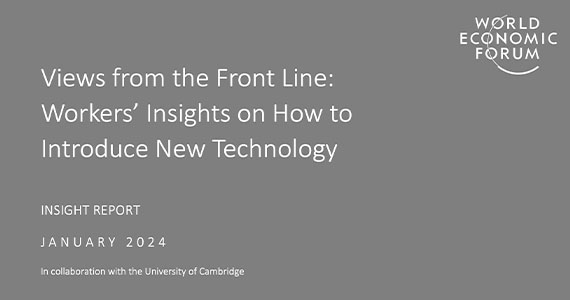IfM report to launch at WEF Annual Meeting in Davos

Dr Thomas Bohné and PhD student Jessica Horn in the IfM’s Cyber-Human Lab have led the work on the World Economic Forum (WEF) report, ‘Views from the Front Line: Workers’ Insights on How to Introduce New Technology,’ published today. The report takes a human-centric approach to manufacturing companies’ adoption of new technologies on the shop floor, focusing on front-line workers’ perspectives.
There is more to technological progress than developing new and improved tools and techniques. Technologies exist to extend and enhance human capabilities, but the human part of the equation is often neglected. In collaboration with the WEF Manufacturing Workers of the Future initiative, Thomas and Jessica address the implications of this challenge for the manufacturing sector and set out concrete recommendations for action.
“The perspectives of front-line workers, who are often end users of technologies on the shop floor, are frequently overlooked both in research and when projects are implemented in industry. Our report provides insights from workers on how new technologies may be more successfully introduced. Our findings thereby add value to companies, resulting in higher employee retention, improved employee satisfaction and a measurable return on investment (ROI) due to more efficient and effective technology introduction,” says Jessica.
Extended Reality (ER) headsets, exoskeletons and cobots are a few examples of augmentation technologies with applications in manufacturing that are specifically mentioned in the report. Because these are advanced, human-centric technologies with great potential to boost productivity and profitability, it is critical that companies do their bit to facilitate smooth interactions between the relevant technologies and the people set to operate them. As front-line users, workers are more commonly talked about than with when decisions about technological innovation are made. The authors set out to change that with three concrete recommendations.
Building on more than 85 interviews with workers from major international companies operating in America, Asia and Europe, the recommended steps are a call to action for manufacturing managers:
- Before implementation: Managers must ensure a value- and problem driven approach. Workers have to know the bigger picture when planning to take on new technologies and managers must especially focus on benefits for all stakeholders and the underlying decision-making process.
- During: Managers must communicate clearly with workers during the introduction of new technology, giving realistic timelines and catering to different learning needs and preferences.
- After: When new technologies are introduced, managers should remain actively engaged by collecting feedback on the technology, revising and updating training resources, onboarding new employees and acknowledging and rewarding successes.
The report will be the topic of a panel discussion in Davos next week, where members of the World Economic Forum convene for their Annual Meeting. The session titled “Empowering Humans and Machines in Industry” will take place on 16 January between 3:00 and 3:30 CET and can be viewed via the WEF website. As head of the Cyber-Human Lab, Thomas and his team work to enable better collaboration between people and machines, and he is hopeful about the report’s impact:
“We hope that our research will prove useful for middle and upper manufacturing management who are directly involved in introducing technologies on the shop floor. As new and more powerful technologies such as AI are introduced alongside workers in manufacturing, the report is a timely reminder of the importance of the perspectives and role of workers to ensure a successful implementation. Similarly, we also hope that academics find the report interesting because integrating insights from frontline workers into technology implementation decisions is not well researched and most implementation frameworks have focused only on the perspectives of managers, which are clearly important but insufficient.”
The report is available to read on the World Economic Forum website.
Find out more about the Cyber-Human Lab.









